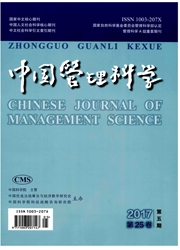

 中文摘要:
中文摘要:
基于博弈论和委托代理理论,研究了非对称信息条件下供应链节点企业间如何进行质量信号传递的问题。供应商对生产过程投资水平进行决策并采取质量预防策略,为获得最优质量契约可将其生产过程水平类型以信号传递给生产商,其对接收到的中间部件或原材料进行质量评价决策和加工处理决策。运用最优化原理,构建了生产商产品质量决策控制模型,并对生产商支付的"信息租金"进行了量化的描述并进行了仿真检验,结果证明:供应商有激励性动机将其生产过程水平类型以信号传递给生产商,并提高中间部件或原材料质量水平;当生产商观测到供应商所提供的产品质量信号后,将降低其产品质量检验水平、提高加工处理水平,增加向供应商的前向支付,作为对供应商提高产品质量水平的质量奖励,同时整个供应链的联合期望收益将显著增加,并使生产商为获取供应商产品质量水平向其支付的"信息租金"减少。最后论证了供应商进行产品质量信号传递过程中"棘轮效应"的成因,并给出了以上各结论相应的定量分析与证明。
 英文摘要:
英文摘要:
Based on the game theory and principal-agent theory,this paper studies the problem of how to signal product quality in supply chain under the conditions of asymmetric information.The supplier makes the decision of production process investment level and determines quality prevention strategy,who may signal the type of the production process investment level to the producer in order to obtain the optimal incentive contract,and then the producer makes the quality appraisal decision and processing decision when it receives the intermediate components.We use the optimal theory to establish producer's quality decision control model and describe the information rents.The simulation results will show that the supplier has incentive to signal the type of production process investment level to the producer,and improve its product quality level.When the producer observes the signal of product quality,it will reduce the quality inspection level,improve the processing level and increase the forward payments,which will be as supplier's quality rewards.Meanwhile the whole supply chain's joint expected profits will increase,and then the producer will reduce information rents.Finally,we investigate the causes of ratchet effects and provide corresponding quantitative descriptions and proofs respectively.
 同期刊论文项目
同期刊论文项目
 同项目期刊论文
同项目期刊论文
 期刊信息
期刊信息
